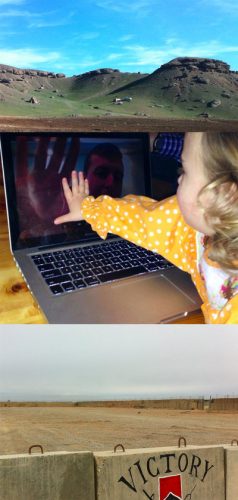
As you drive north from Herat towards the dusty town of Towrahgundi, a smuggler’s den on the border with Turkmenistan, you take a trip through Afghan history. On the other side of three inches of bulletproof glass, centuries pass.
From the scarred U.S. Consulate still under reconstruction from a September attack, one passes the Mujahedeen Museum where the memorabilia of the war against Russia is proudly displayed, guarded by an abandoned MiG fighter. Climbing in elevation, one begins to pass ostentatious restaurants and four-story houses, surfaced in white and blue Herati marble, above the campus of Herat University. The sight brings to mind ancient Herat, a center of commerce and culture where is it said one could not extend a foot without kicking a poet.
Continuing on, the marble décor falls away in favor of brick, and the buildings begin to shrink, moving quickly from five stories down to one. After a few miles the brick turns to packed mud and the power lines cease to reach down to the structures below. Driving on, eventually all structures disappear, replaced by tarp-covered entries into the rocky, brown hillside outside of which children play and laundry hangs. Between the hills, farmers in a honeycomb of irrigated plots struggle to scratch life from the ground.
Even this last vestige of civilization fades, with the clanging of bells around the neck of a shepherd’s flock marking the end of Herat’s reach. Beyond, there is nothing for miles but dry, blue sky and desiccated, brown countryside. In some trick of optics, the thick glass brightens the blue of the sky.
It is said America has not fought a 12-year war in Afghanistan but rather 12 one-year wars, each defined by a different focus, sometimes at cross-purposes with the efforts of the years before. The year ahead is focused on logistical retrograde with consolidation into a few enduring bases. Any facility not handed over to the Afghans is to be restored to conditions prior to 2001.
Camp Stone, a sprawling base in Herat province, is one of the bases being retrograded. Once home to over a thousand American soldiers, it served as the center of American operations in Herat. Though a portion of it has been turned over to the Afghan National Army, the vast majority of it has been returned to windswept wasteland. American soldiers even collected the gravel onto trucks protected by the massive armored vehicles and drove it away. Scoured over by men looking for anything that could be sold, then by children collecting anything that could be burned, eventually even the tumbleweeds were packed onto a mule’s back and carried off.
For Americans charged with helping to building a better future for Afghanistan, the effort to return much of the country to emptiness is difficult to accept.
But where it appears there is only emptiness, if you keep driving north from Herat on a Friday afternoon during warm weather, an amazing thing happens. Eventually the hillsides begin to be dotted with picnicking groups. Through the glass you can see men, children, and even a few women sitting on blankets, sharing a meal or an apple-flavored water pipe, and challenging their trucks in climbs up the sheer hillsides.
Is such a peaceful scene possible because of our withdrawal or is it the last gasp of Herati families trying to hold on to normalcy in the face of potentially violent future? Is this a sight to celebrate or, in a region known for opium smuggling since the fall of the Taliban, is something sadly illicit happening?
I am told it is no longer our responsibility to find out, and it likely is beyond our capability to do so. That is what ending this war means—accepting what we cannot do and hoping we have done enough. A painful proposition when it is a truism that “hope” is not a military option.
As this last phase of the Afghan war begins, the ability to disassociate oneself from the Afghan people seems vital. Their future and ours are diverging. After so many years in which their protection and well-being were the goals of every servicemember, the new reality is strange to accept. Perhaps President Karzai will allow an American presence past 2014, perhaps not, but regardless, that presence will not be the guarantor of progress in this nation.
Disassociation has long been a necessary skill for a servicemember. It is taught to quicken a trigger pull with another human being in a weapon’s sights. It is used as a body’s heat signature fades after a drone strike. And now it is used to a different end as we pack up, with the fate of Afghan friends, comrades, and innocents still uncertain.
Today, technology allows me to reach across the world to celebrate Christmas with my daughter and wife, even as the coalition retreats from efforts to improve the lives of Afghan women and children. It is little wonder that this lifestyle scars — even those unscathed by violence. How many times can you cycle your sympathy towards fellow human beings before damaging the switch? How long can you live behind glass before you can no longer break through? Perhaps those questions reach beyond the military experience here.
Every service member will eventually leave Herat, the numbers dwindle by the week. Most will fly out rather than drive. But as they leave Herat, each will likely encounter their own undefined landscape. Each will likely be challenged to examine their past here and make something of that landscape. I hope that despite the disappointments for what we have been unable to accomplish in Afghanistan, my horizon — and the horizon of those with whom I have served — will be filled with picnicking families rather than simply empty desolation. And when I return to my loved ones in the new year, I pray that Herat will be left with more than simply rolling tumbleweeds to remember us by.